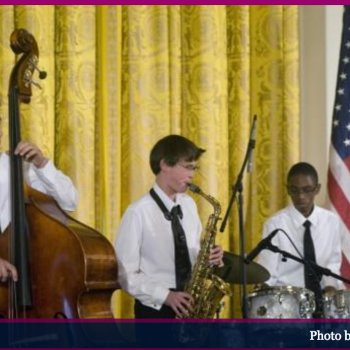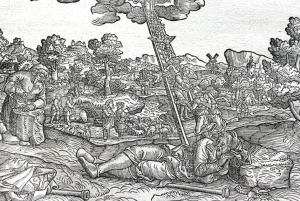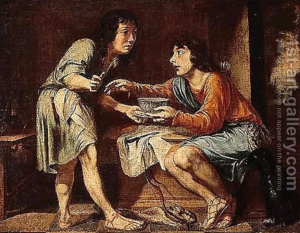 Huge Gap Threatens the Church, the headline should read.
Huge Gap Threatens the Church, the headline should read.
Or Earthquake at the Foundation of the Church, as the Global South, rife with Pentecostals, separates from the mainline churches of Europe and North America.
Or how about The Church is Dead, but Don’t Tell the Pentecostals!
These headlines probably won’t cause you to rush out to the grocery store to hoard the last few gallons of milk or hurry to Home Depot to grab propane generators, but the growing gap between North and South, Pentecostal and Mainline, is the stuff of headlines. When one segment of the church shrivels, sloughing off congregations right and left, and another segment is on fire, heading to a billion only a decade or two from now, well, you’ve got yourself the stuff of schism.
What to do?
Option one: ignore the Pentecostals. I was sitting in the famed Beethoven Café in Munich, luxuriating in Apfelstrudel smothered in an inch and a half of custard, with some dear friends, both German Methodist pastors. One of them had just read Fresh Air, so we were talking about Pentecostals. He said, “We [German Methodists] just don’t talk about them.” I suppose it’s possible to pretend a billion Pentecostals worldwide aren’t there by not talking about them.
Option two: disparage the Pentecostals. There’s much to mock in modern Pentecostalism, no doubt about it—people sliding off chairs in allegedly inspired laughter, fraudulent healers, ultra-conservative politics. But mocking is what onlookers did at the first Pentecost. Remember? The house shook, the Holy Spirit descended, the followers of Jesus spoke to a colossal crowd of pilgrims gathered in Jerusalem for the feast of Pentecost. The story goes like this:
When the day of Pentecost had come, they were all together in one place. And suddenly from heaven there came a sound like the rush of a violent wind, and it filled the entire house where they were sitting. Divided tongues, as of fire, appeared among them, and a tongue rested on each of them. All of them were filled with the Holy Spirit and began to speak in other languages, as the Spirit gave them ability. (Acts 2:1-4)
When the dust settled, Luke tells us, “All were amazed and perplexed, saying to one another, ‘What does this mean?’ But others sneered and said, ‘They are filled with new wine’” (Acts 2:12-13).
We can sneer at the Pentecostals, given the aberrations and excesses of their faith, but we might be, in the long run, outsiders looking into the future of Christianity.
Option three: join the Pentecostals. I didn’t say “become a Pentecostal.” I said, “join the Pentecostals.” How? Again, the clue lies in the story of that first Pentecost.
Filled with the Holy Spirit, the followers of Jesus could be understood “in the native language of each” person gathered in Jerusalem. The miracle of Pentecost is not one of incomprehensibility, babbling in unknown tongues, but ultra-comprehensibility, extreme and surprising unity.
What was the content of this single comprehensible message? The praiseworthy acts of God. These words are a catchphrase for God’s mighty acts in Israel’s history—and for Jesus’ followers, recent history: the life, death, resurrection, and ascension of Jesus. The phrase occurs in the Greek version of Deuteronomy 11:2-5, where Moses says,
it was not your children … but it is you who must acknowledge God’s praiseworthy acts, God’s mighty hand and God’s outstretched arm, God’s signs and God’s deeds that God did in Egypt to Pharaoh …
A magnificent psalm begins,
O give thanks to the LORD, call on God’s name,
Make known God’s deeds among the nations.
Sing to God, sing praises to God;
Tell of all God’s praiseworthy acts. (105:1-2)
When the Holy Spirit first fills the followers of Jesus during the feast of Pentecost, they recite those praiseworthy acts. For all the talk in Luke’s Pentecost story of speaking in other tongues, for all the emphasis on the miraculous sound and the rush of a violent wind, for all the focus on divided tongues as of fire, for all of this, what rises to the surface when the dust settles is a crisp and clear recitation of the praiseworthy acts of God.
What then to do? Use this Pentecost–Sunday, June 8th–to do something new, at least new for most of us. If you’re a mainline Christian, get together with a Pentecostal to memorize God’s praiseworthy acts. If you’re a Pentecostal, join a mainline Christian in memorizing God’s praiseworthy acts.
This proposal is simple. Too simple? I hope not, since the unity of the church may be riding on simple proposals just like this one.
______________________________________________________________________________
Art by He Qi. “The Holy Spirit coming.” He Qi Gallery, http://www.heqigallery.com/. Used with permission.












